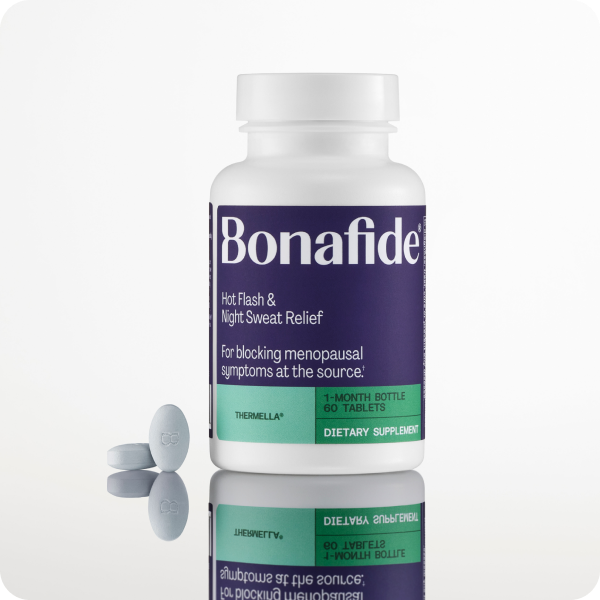If you’re experiencing hot flashes during menopause, you’re not alone. Most women — between 60 to 80% — experience hot flashes while going through the menopause transition.1 They usually last anywhere from six months to two years, although they can go on longer. That’s the bad news. The good news? Lifestyle choices can help to decrease or even eliminate hot flashes; a specific area to focus on, in terms of how to reduce hot flashes, is your diet.
So, what specific types of food or beverages may cause hot flashes during menopause? Let’s dive right in.
And if you're looking for a quick video on what to do about your diet to deal with hot flashes, check out this short video from Chief Medical Officer, Dr. Alyssa Dweck:
Foods That Can Cause Hot Flashes
Hot Flashes After Drinking Coffee
It’s no secret that hot flashes at night, also known as night sweats, can cause sleep problems. Who can get a good night’s rest when they’re sweating bullets? In the morning, a cup of joe can be a quick pick-me-up. The problem? There are two: caffeine and heat. Women who experience hot flashes after drinking coffee may benefit from moderating their caffeine intake. If you can’t bear the thought of giving up coffee altogether, try it iced and cut yourself off at noon if you’ve been experiencing hot flashes after drinking coffee.
Eating Chocolate May Trigger Hot Flashes
Like coffee, chocolate is also considered to be a food that can contribute to hot flashes. Chocolate contains caffeine, which may cause hot flashes.2 Chocolate also contains another chemical that can affect the brain’s temperature control center contributing to hot flashes. Sugar can also make hot flashes worse. While you don’t have to give up chocolate for life – how sad would that be – if you’ve noticed a connection between eating chocolate and when you experience hot flashes, saving it for special occasions might be a good idea.
Spicy Foods Can Cause Night Sweats or Hot Flashes
Have you ever eaten a meal so spicy that it made you sweat? It’s because those curries and bowls of chili don’t just taste hot – they’re actually raising your body temperature and can be considered foods that cause hot flashes. This is the exact opposite of what you want while going through menopause. Next time, consider asking for “mild” when ordering these types of dishes. Giving up some of the heat on your plate may spare you from triggering hot flashes and night sweats later on.
Hot Foods Can Also Trigger a Hot Flash
If you get hot flashes after just drinking hot coffee, eating straight-from-the-stove foods may also make hot flashes worse. If you’re eating out, consider skipping the soup starter and opting for a refreshing salad instead. This smart move provides a second benefit: the salad may also give you some of the vitamins that are helpful in preventing hot flashes. At the very least, let hot foods cool down before digging in.
Hot Flashes After Drinking Alcohol
Drinking alcohol regularly can cause hot flashes to happen more often, last longer and be more severe. If you notice a connection between hot flashes after drinking alcohol, consider cutting down. Also, try not to drink alcohol too close to bedtime, as it can encourage night sweats.
Lifestyle adjustments can help you manage the heat of hot flashes.
If you find that any of the foods or beverages mentioned here are triggering your hot flashes during menopause, consider making some of the small tweaks mentioned here to see if they help.
Resources
- Gold EB, Colvin A, Avis N, et al. Longitudinal analysis of the association between VMS and race/ethnicity across the menopausal transition: Study of Women’s Health Across the Nation. Am J Public Health. 2006;96(7):1226-1235.
- https://www.mayoclinic.org/diseases-conditions/menopause/expert-answers/menopause-symptoms-caffeine/faq-20119077#:~:text=Answer%20From%20Tatnai%20Burnett%2C%20M.D.,blood%20vessels%20(vasomotor%20symptoms).











Comments
Post commentSounds like a healthy plan! All of those foods give me hot flashes. I started them at 48 and continue them now at 55. Soooo over it, so I guess it’s bye bye to my favorites! (Except maybe one cup of hot coffee in the morning!)
I’ve had hot flashes since menopause started at age 40 and they continue today, at age 71. Thank God for Relizen, it has stopped them in their
tracks. Bonafide has helped me in so many ways. I am beyond grateful for this wonderful article. I love coffee, chocolate, spicy foods and hot foods.
I don’t drink alcohol, and yes, they all give me hot flashes. I lost 100 lbs. by quitting sugar and rarely did I get hot flashes during that time. Now,
when I eat chocolate or have hot coffee, or sugar the flashes return. Great Article, many thanks. Nina
There are many foods that you can eat that can help alleviate hot flashes. Try more fruits and veggies, especially cooking fruits like watermelon and vegetables like celery. Also, try adding a fermented product like kefir to your diet. Boosting your micro biome helps your body re-absorb some hormones as there are estrogen receptors in your intestines. I still drink a cup of coffee in the morning but I add in lots of veggies and fruit and haven’t had a hot flash in over a year. Everyone is different obviously, but thought I would share.
Coffee is hard because i have used it so many years to start my day. I love spicy food and dark chocolate. What is left for me, I’m suffering through menopause as it is. Now I can’t enjoy the only three things I enjoy. It’s crazy but I must learn to adjust.
Wow! Giving up my hot cup of Joe will be hard but I’ll do anything to lessen these flashes. I appreciate those tips.